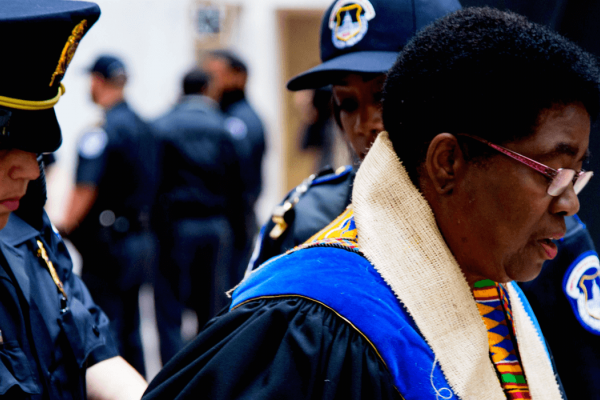YOU MAY REMEMBER the images of disabilities advocates arrested last year, some handcuffed in their wheelchairs, outside Senate Majority Leader Mitch McConnell’s office. Or the pastors arrested holding signs that said: “Love Thy Neighbor.” Or the waves of clergy and faith-leader arrests in Ferguson and Standing Rock, and those advocating for Dreamers and opposing tax cuts for the rich.
Maybe you heard about pastor Jarrod McKenna and Delroy Bergsma in Perth, Australia, who suspended themselves four stories above the office of Foreign Minister Julie Bishop to persuade the Australian government to act for refugees held on Manus Island without supplies. Or last year’s witness on the steps of the Supreme Court where 18 people of faith were arrested protesting the death penalty. Or the August gathering in Charlottesville, Va., where hundreds of courageous pastors, clergy, and other activists confronted the hatred of torch-bearing neo-Nazis and white supremacists.
These events aren’t about going to jail. They are about countering hatred with nonviolent love.
Civil disobedience is holy work. Gandhi called nonviolent civil disobedience “our sacred duty.” There are many ways to nonviolently resist injustice: Boycotts. Divestment. Writing op-eds. Petitions. Lobbying. Prayer vigils. Groundswell campaigns. Picket lines. Strikes. Die-ins. Sit-ins. Lock-downs. Distributing flyers on street corners. (Famously, the late political scientist Gene Sharp listed 198 methods of nonviolent direct action.)
Going to jail isn’t the only way to resist evil. But it is one way. And a very effective way, with a rich tradition for Christians. Though questions of privilege arise when it comes to risking arrest, what also surfaces is that some people have nothing to lose “but their chains,” as the chant goes. Many marginalized people have found civil disobedience to be a way to rage collectively against injustice and to stop business as usual.
Read the Full Article

